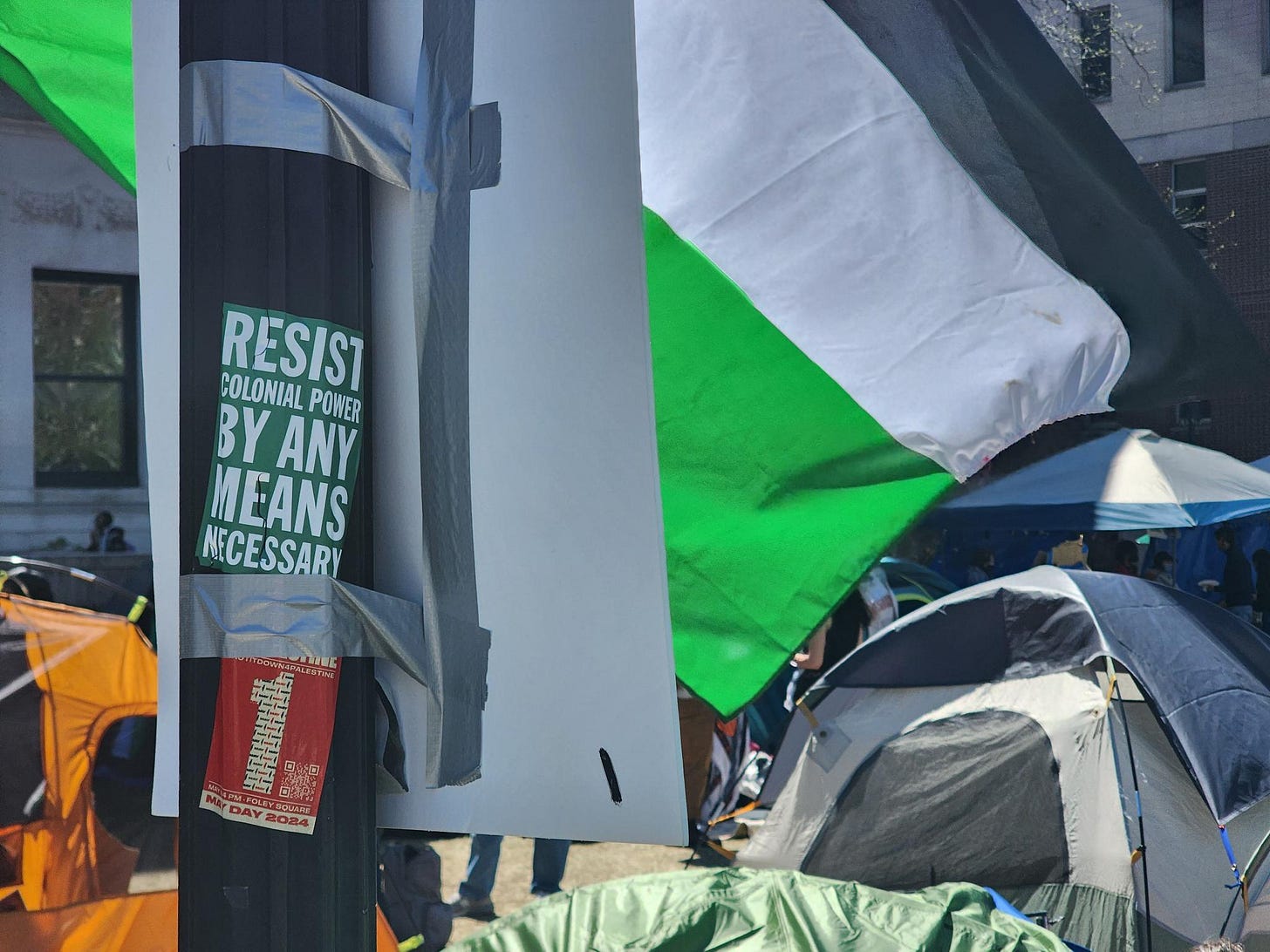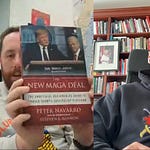"Tired, shaky, worried, afraid — all these worlds could be used to describe the students remaining on the Columbia University campus last week," reads a dispatch, written by a Columbia student, in The Boston Globe.1
The campus had been riled by protest for weeks. The campus revolutionaries weren’t going to quit until their aims were met: Break Columbia’s ties to defense contractors, stop appropriating land in nearby Harlem, and give students more of a say on what their university does.
The Globe quotes one protesting student asking, rhetorically: "Should a university be engaged in military research?"
To make their point, the students at Columbia took over and occupied university buildings. They smashed windows and pillaged the campus. “Nazi Tactics Copied At Columbia,” declared one columnist.2
The university administration sent in the NYPD. Which, unsurprisingly, only further rankled the students. As one student told the Globe: "The university should also be a place for free and open discussion of ideas, not repression and police.”
This was April 1968. The Vietnam War and the slow progress of civil rights were pushing students into the streets — and then, back onto their college campuses. We look back at those protests, now, with some degree of nostalgia. They were fighting to end a brutal and pointless war, and to extend rights to those who had for too long been deprived. As the Columbia University Library itself notes, that month a half-century ago “marked a sea change in the relationships among Columbia University administration, its faculty, its student body, and its neighbors.”
At the time, however, these students were pilloried as violent radicals and they certainly did not have public opinion on their side, nevermind the support of the administration. A Harris Survey in 1970 found that 52% of America believed that “student discussions and demonstrations are not a good thing during a crisis when American troops are fighting abroad." An even bigger majority, 57%, agreed with the statement "college presidents are far too lenient with student protesters and encourage disorder on campus.”
America, in particular, was objecting to the very things that earned these protesters headlines. During their occupation of one building, the students (briefly) trapped a dean and some professors inside. Black students, furious at rumored plans to segregate a planned gymnasium, evicted their white classmates from one residence and declared it the Malcolm X Liberation College. Fist-fights and scuffles with cops were reported across the Columbia campus — in 1970, someone bombed the university’s famous statue. Students across the country chanted “Ho, Ho, Ho Chi Minh!” and waved Viet Cong flags. As the state meted out an ever-more heavy-handed response, the students radicalized in turn. The Weather Underground, which sprang up from the University of Michigan, took its terror campaign on the road, planting bombs across the country.
As one newspaper editorial proclaimed, whatever the merit of their objectives, the protesters were “wrecking their own effort” with all this radicalism.3 That certainly aged like milk.
We have arrived, 56 years later to the day, full-circle. Campus unrest, much more tepid than it was a half-century ago, is back in the news. And, once again, we are subjected to lectures about how these naive students are a threat to Western liberalism, how the protesters are dangerous extremists, and how the only way to restore order is with police force.
This week, on a very special Bug-eyed and Shameless, I say: Hey, teacher, leave those kids alone.
Last week, I jaunted down to New York City last week, on assignment for The Line. I give you full permission — nay, I implore you — to give that dispatch a read first.
In this supplementary piece, I want to do three things. First: To serve up a mini podcast episode featuring some of the sounds from the encampment — and the counter-protest. Then, I want to break down a bit of the gap between the image of these student protesters dominating the mainstream press and who they actually are. Finally, I want to talk about some of those leading the charge against these students. Spoiler alert: They’re guilty of many of the same things they accuse the students of.
Just as the public rejected the anti-war student protesters in 1968, we’re in the midst of a moral panic. We are villainizing — instead of reasoning with — students who are, at least in part, right.
I confess I, initially, had a hard time coming to any kind of position on these pro-Palestinian campus protests.
I’ve had a rule for a long time. It’s a simple rule and it goes like this: What students do on-campus is none of my business. Campus politics is a weird and insular business, and it should be the primary concern of students and student journalists. The provincial grievances and ideological spats that have always defined higher education are a big part of how young people come to shape their worldview, and serves as a sandbox for students to figure themselves out — having the rest of us crowd our way in to police those conversations mucks all that up. I also, just generally, don’t really care. I held this position quite staunchly during the previous moral panic, around the supposed death of free speech on campus, and feel very vindicated by it. (Where are those people now, by the way?)
That’s how I first approached this Columbia encampment. But it became clearer and clearer that the international media fixation on the anti-semitism problem on campus was spinning off into a frenzy. Considering I was, as research for my book, in the middle of reading panicked newspaper columns from 1968, warning that campus unrest amounted to a fifth column of Commie infiltration — I was inclined to think we might be falling into old patterns.
But let’s start with basic facts: There are anti-semites, both within the campus protesters and amongst those who have glommed on to the attention around it. That’s a basic fact. Just how prevalent and militant they are, however, is the real question. Consider some data points that have made headlines:
There was the protester at Northeastern University who screamed “kill the Jews.” A Jewish student at Yale was stabbed in the eye with a Palestinian flag. Khymani James, one of the Columbia protest leaders, recorded himself saying that “Zionists don’t deserve to live.” And there were the protesters at Columbia who proclaimed “we’re all Hamas” and “October 7 is about to be every day.”
These videos, tweets, and stories go uber-viral — the further context often doesn’t.
The person screaming “kill the Jews,” for example, was a pro-Israel protester, waving an Israeli flag, who wanted to stir up trouble.
The student who was stabbed in the eye was, more likely, accidentally poked. She is also an active campus conservative with a history of telling tall tales.
James, for his part, really did say a series of outrageous and horrifying things justifying the murder of Israelis — not mentioned, however, is the fact that he is 20 years old. That doesn’t excuse what he said, but it does help explain it. There are a lot of 20 year olds who believe radical and stupid things, all across the spectrum: We should probably stick to worrying about those who actually want to put their hate into action.
And finally, there have been signs, comments, and chants for which no further context is needed: Yes, some Columbia students and outsider protesters have celebrated Hamas and October 7. Some of the biggest pro-Palestinian student groups on campus released statements essentially justifying the horrific violence of October 7. That, we can say, is pretty disgusting.
There has been, however, lots of speech that makes people uncomfortable. These protesters have charged, with absolute certainty, that Israel is guilty of genocide and is an apartheid state, akin to South Africa. They believe their university collaborating with defense companies working with the Israeli Defense Forces are complicit in that genocide. They have likened Zionist to fascism and some have even denied Israel’s right to exist, believing instead that there ought to be a single Palestinian state.
You agree or disagree with any or all of that — some of it, you almost certainly should — but it ought to be protected speech. It may provoke emotional debates and arguments, but it is not violent: It is criticism of a nation-state. Conflating that with an incitement to violence is a common tactic that we need to reject.
So what are we really talking about? Survey the landscape of North America over recent weeks and we can say, yes, there have been a small handful of genuine appeals to violence and even a few fistfights. That’s obviously bad. And then there has been a slightly bigger number of troubling statements and chants. And then there’s the even bigger preponderance of arguments and accusations that some may find uncharitable or even offensive. And finally, there is the overarching goal that unites every protester and protest: A call for a ceasefire in Gaza.
We can quibble about how big each of those concentric circles are, but in my afternoon at Columbia — where I talked with protesters and non-protesters, including several Jewish students — the consistent message I heard was that the whole problem has been wildly overblown.
This is what I heard from Daniel, a Jewish student who was not part of the encampment and had pretty mixed feelings about them. I found myself pretty immediately identifying with him:
I think they have a right to be here. It's an act of protest. I also have a right to be here, because it's my campus. […] I tell this to all my friends: Every time I see Columbia in the national news, I die a little bit on the inside. I don't like it when we make national headlines. I don't think it's something that deserves that much coverage. I think it's been blown way up. […] I was called a slur, off-campus, on Monday. There have been, chants: “Go back to Poland“ to random Jewish people. There was a an Israeli social media personality was punched outside the gates a few days ago […] There’s very clearly some students chanting that. Most of the people chanting, I would like to think, aren't students. […] You’ve gotta go to class with people you disagree with, even if they they think horrible things. I know there are a lot of very far-right people at the school who think also very bigoted things, and I've known that for years, and I still sit through class with them. Because they're here, I'm here. And I'm not going to let them disrupt my life like that. […]
Do you think it’s unsafe here? Or just uncomfortable?
It’s very clearly uncomfortable. Unsafe? There have definitely been anecdotal experiences where students have felt unsafe or been unsafe. [sigh] I dunno, as a Jewish person in the U.S., you grow up with the notion of: Oh, a bomb threat gets called into your school. That's just like a regular occurrence. There's security everywhere. And then obviously, sometimes, like in Pittsburgh at the Tree of Life, somebody actually makes good on those threats. The way we were raised, when people say: We're gonna kill you, we're gonna kill you, you're not going to take any chances. I just will take them at their word.
We, clearly, need to be alive to actual incidents where people are calling for violence against Jewish students — if there are charges that ought to be filed against those individuals, I don’t think anyone is going to object.
But we have wound up with a very skewed image of who these protesters are, and the apparent threat they pose. And it is justifying both a crackdown on free speech and a militarized response to students peacefully and respectfully protesting — including the Jewish ones. It has become grist for politicians like Tom Cotton and Mike Johnson have called for police to be dispatched to crack skulls, so they can audition for Donald Trump’s favor.
It’s a canard.
Speaking of Tom Cotton, Mike Johnson, and Donald Trump.
It is very convenient that the U.S. Republican Party has suddenly discovered a fear of anti-semitism. Because anti-semitism has certainly been allowed to seep into the Republican Party from all sides for years — and it’s been welcomed.
Nick Fuentes, an actual neo-Nazi, was invited to dine with Trump at Mar-a-Lago in 2022.
The mass shooters who attacked the Tree of Life synagogue, the Tops supermarket in Buffalo, and a general store in Jacksonville — amongst others — were radicalized into white supremacist and anti-semitic conspiracy theories. And yet the language behind their ideology, including the great replacement myth, has become fully adopted by the Trump campaign and major right-wing figures like Tucker Carlson.
QAnon is, at its very core and in the ways it manifests, an anti-semitic conspiracy theory. It relies on the idea that the secret international banking cabal, usually identified to as the Rothschild family, is the global deep state — this unhinged belief has been used to demonize Jews for more than a century. The deranged adrenochrome fantasy, which accuses political leaders of sucking the blood from stolen children, is just a modern twist on the blood libel nonsense. And Trump posts Q memes on the regular, now.
Elon Musk, the richest man in the world, was giddily promoting an actual, bonafide neo-Nazi to try and take down the Anti-Defamation League (Dispatch #69) — and the national media treated it like a genuine debate around free speech.
So it is, of course, deeply hypocritical that the American right is now suddenly concerned about anti-semitism, but only as it is being espoused by young leftists.
Anti-semitism is a real problem. But if it is being used as a charge only to prosecute one’s political enemies, then you are really just wielding Jews as a political weapon.
Perfectly illustrating this problem is the fact that, not long after I finished my tour of the Columbia campus, a group of counter-protesters took off on a “United for Israel March.” It was led by three Evangelical Christians, and attended by a real motley crew of people. The majority, I’d say, were Jewish counter-protesters, upset with the idea that an anti-semitic encampment was taking place inside Columbia. In the same way that we shouldn’t smear most of these Columbia students for the dumb, even anti-semitic, remarks of a few of their classmates, these folks — who carried photos of the Israeli hostages and chanted “bring them home!” — seemed very well-intentioned.
Some, however, were less pleasant. One perplexingly berated the Columbia students as being led by “the Antichrist.” A few older people in the crowd heckled and accosted students heading onto campus. One woman carried a sign riffing on a much-debated protest chant: “From the river to the sea/That’s the only flag you’ll see!” featuring a drawing of the Israeli flag. (You can debate whether the original chant is anti-Israel, but that sign is anti-Palestinian.) I heard these counter-protesters get into it with Orthodox Jews who reject Zionism, calling them “fake Jews” and “disgusting.”
Ultimately, the protest wound up at the gates of Columbia, where they proceeded to camp out for hours. A group of pro-Palestinian demonstrators (counter-counter-protesters?) assembled across the street and chanted “free, free Palestine!” Apart from one keffiyeh-wearing guy being hauled away by cops and one woman who screamed “Intifada!”, I didn’t see them try and instigate anything. I did see, however, a few pro-Israel counter-protesters approaching the other side looking for a fight, only to be dissuaded by the NYPD, who had begun to read the riot act.
Protests are big, messy spectacles. People say stupid, unhinged, even offensive things. We should define our politics around the point of these protests, and their stated aims, not on comments screamed or chanted by their participants in the throes of adrenaline. That’s as true for the protesters on campus as the counter-protesters outside.
If we look at the stated aims of the counter-protest and its organizers, however, it might cause us to wonder why all the attention is being paid to a rump of students trying to change university policy — and not the Christian nationalists with the ear of the former president.
While I’m not sure how many in the crowd were aware of them — like I said, the crowd seemed mostly Jewish — the march was put together by right-wing Christian radio host Eric Metaxas, pastor Russell Johnson, and musician Sean Feucht.
Russell Johnson was one of those rabidly anti-public health religious zealots who gained popularity online during the pandemic. He’s a former Republican organizer who is now putting his youth pastor chops into action to claim the government is coming to criminalize Christianity. (And he takes plenty of shots at trans people while he’s at it.)
Metaxas rose to prominence a few years ago, with a message that the Christian church ought to insert itself much more intensely into American politics. He has been tight with white supremacist Pizzagate conspiracy theorist Jack Posobiec, railed against COVID-19 vaccines alongside the deranged Epoch Times, joined the election denialist movement after the 2020 U.S. election, and welcomed QAnon pillowlord Mike Lindell onto his show. He accused “the Democratic establishment” of behaving like Adolf Hitler for saying Trump’s supporters were in the wrong on January 6. (That metaphor is exactly as tortured as you think it is.)
And, finally, Feucht believes that Jesus Christ will be returning to Jerusalem in the very near future — and, of course, that the Jews will suddenly convert when he does arrive. Feucht has built a tight bond with Donald Trump — as well as other prominent Republicans, including Senator Josh Hawley and Florida Governor Ron DeSantis. He’s tight with Charlie Kirk’s Turning Point USA, an increasingly antisemitic affair and has played the ReAwaken America Tour, a far-right, Christian nationalist, QAnon shindig. Feucht also happens to be a follower of Kim Clement, the supposedly prophetic Pentecostal pastor beloved by the MAGA crowd. (Dispatch #13)
Despite the well-known beliefs and obvious ties to antisemitic movement of these three yahoos, their march received some positive press from Newsweek and Fox News.
The Fox coverage offers a nice little parable about how these issues get spun out to absurdity. One of the Jewish counter-protester told the anchor that the biggest problem with the march were pro-Palestinian "agitators” wielding “signs that were quite frightening” including a promise to liberate Palestine — “the liberation of Palestine means the murder of Jews,” he solemnly tells the viewers.
Enough.
That’s it for this week!
For my Canadian subscribers, I was on the CBC’s Front Burner podcast today, talking about the origins and intentions of the “Fuck Trudeau” sloganeering. For the Ukraine-watchers, I was on the Battleground podcast last Friday, talking about some of my reporting from Kyiv. (My feature, for WIRED, on Ukraine’s nascent drone industry, should be out soon.)
Expect more Bug-eyed and Shameless in your inbox next week.
The Boston Globe, Jun 02, 1968. A5.
The Palladium-Item, May 03, 1968. Page 10
The Wichita Eagle, Jul 09, 1968. Page 4










